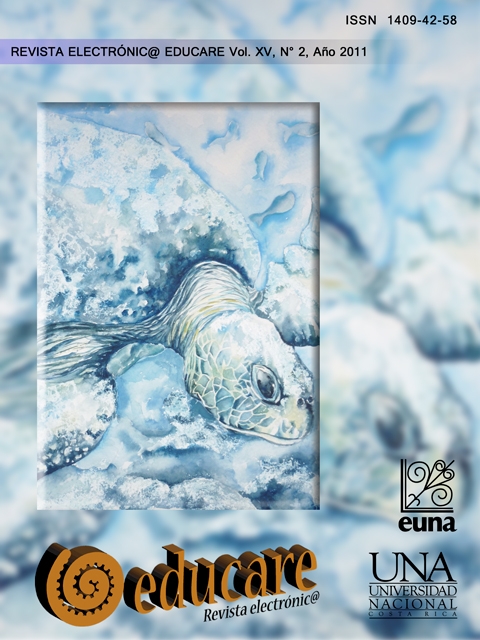Environmental Education as a Life Philosophy
DOI:
https://doi.org/10.15359/ree.15-2.15Keywords:
Culture, Ecology, environment, ethics, responsibility, societyAbstract
Abstract. Environmental education (E. E.) is of great importance in preserving the environment, transmitting values based on sustainable development. However, given the current environmental paradigm, we must reflect on the question: is it necessary to approach E. E. from a broader perspective or are we seeing E. E. from a narrow perspective? People’s relationship with the environment needs to change. This means that the efforts and principles of E. E. should be adopted and applied in our daily live, making it a philosophy of life, deep inside each person, thoughtful and based on ethical principles. Thus more responsible and committed actions and attitudes could be achieved, which would contribute to environmental care. This may be a small, but continuous contribution.
References
Arias, M. A., González, E. y Benayas del Álamo, J. (2008). Educación ambiental y sociedad
civil en México: Un primer apunte sobre sus prácticas pedagógicas. En F. Reyes y M. T.
Bravo (Coords.). Educación ambiental para la sustentabilidad en México. Aproximaciones
conceptuales, metodológicas y prácticas (pp. 187-204). Chiapas: Universidad de Ciencias y
Artes de Chiapas. Recuperado de anea.org.mx/docs/EdAmbSustentabilidadMexico.pdf
Bendala, M. y Pérez, J. A. (2004). Educación ambiental: Praxis científica y vida cotidiana.
Descripción de un proyecto. Revista Eureka sobre enseñanza y divulgación de las ciencias,
(3), 233-239.
Chávez, M. T. (2004). La ética ambiental como reflexión en el marco de la educación en ciencias y
en tecnología: hacía el desarrollo de la conciencia de la responsabilidad. Educere. La Revista
Venezolana de Educación, 8(27), 483-488. Recuprado de http://www.redalyc.org/src/inicio/
ArtPdfRed.jsp?iCve=35602706
Elliot, R. (1995). La ética ambiental (Capítulo 24). En P. Singer (Ed.). Compendio de ética (pp.
-404). Madrid: Alianza.
Engels, F. (1980). El origen de la familia, la propiedad privada y el estado (Obras escogidas).
Moscú: Progreso.
Guillén, F. C. (1996). Educación, medio ambiente y desarrollo sostenible. Revista Iberoamericana
de Educación, 11, 103-110.
Gutiérrez, R. (1992). Introducción a la ética. México: Esfinge.
Herskovits M. (1981). El hombre y sus obras. México: Fondo de Cultura Económica.
Kellert, S. y Wilson, E. (1993). The Biophilia Hypothesis [La Hipótesis de la Biofilia]. Washington,
DC: Island Press.
Linton, R. (1972). Estudio del hombre (3ª ed). México: Fondo de Cultura Económica.
Marx, K. y Engels, F. (1980). Oposición entre las concepciones materialistas e idealistas
(Cap. 1). En C. Marx y F. Engels (Aut.). Obras escogidas (Tomo 1, pp. 4-39). Moscú:
Progreso. Recuperado de http://es.scribd.com/doc/22921080/Marx-K-y-Engels-F-Obrasescogidas-vol-1-ed-Progreso-1980
Meza-Aguilar, L. (1992, noviembre-diciembre). Educación ambiental. ¿Para qué? Nueva Sociedad,
, 176-185.
Novo, M. (1996). La educación ambiental formal y no formal: Dos sistemas complementarios.
Revista Iberoamericana de Educación, 11, 75-102.
Sánchez, J. (2006, mayo). Los retos de lo local en lo global: Aportes analíticos y normativos. Iconos.
Revista de Ciencias Sociales, 25, 77-88. Recuperado de http://redalyc.uaemex.mx/src/inicio/
ArtPdfRed.jsp?iCve=50902508
Sierra-Bravo, R. (1994). Técnicas de investigación social (8ª ed). Madrid: Paraninfo.
Downloads
Published
How to Cite
Issue
Section
License
1. In case the submitted paper is accepted for publication, the author(s) FREELY, COSTLESS, EXCLUSIVELY AND FOR AN INDEFINITE TERM transfer copyrights and patrimonial rights to Universidad Nacional (UNA, Costa Rica). For more details check the Originality Statement and Copyright Transfer Agreement
2. REUTILIZATION RIGHTS: UNA authorizes authors to use, for any purpose (among them selfarchiving or autoarchiving) and to publish in the Internet in any electronic site, the paper´'s final version, both approved and published (post print), as long as it is done with a non commercial purpose, does not generate derivates without previous consentment and recognizes both publisher's name and authorship.
3. The submission and possible publication of the paper in the Educare Electronic Journal is ruled by the Journal’s editorial policies, the institutional rules of Universidad Nacional and the laws of the Republic of Costa Rica. Additionally, any possible difference of opinion or future dispute shall be settled in accordance with the mechanisms of Alternative Dispute Resolution and the Costa Rican Jurisdiction.
4. In all cases, it is understood that the opinions issued are those of the authors and do not necessarily reflect the position and opinion of Educare, CIDE or Universidad Nacional, Costa Rica. It is also understood that, in the exercise of academic freedom, the authors have carried out a rogorous scientific-academic process of research, reflection and argumentation thar lays within the thematic scope of interest of the Journal.
5. The papers published by Educare Electronic Journal use a Creative Commons License:














 The articles published by Educare Electronic Journal can be shared with a Creative Commons License:
The articles published by Educare Electronic Journal can be shared with a Creative Commons License: 



